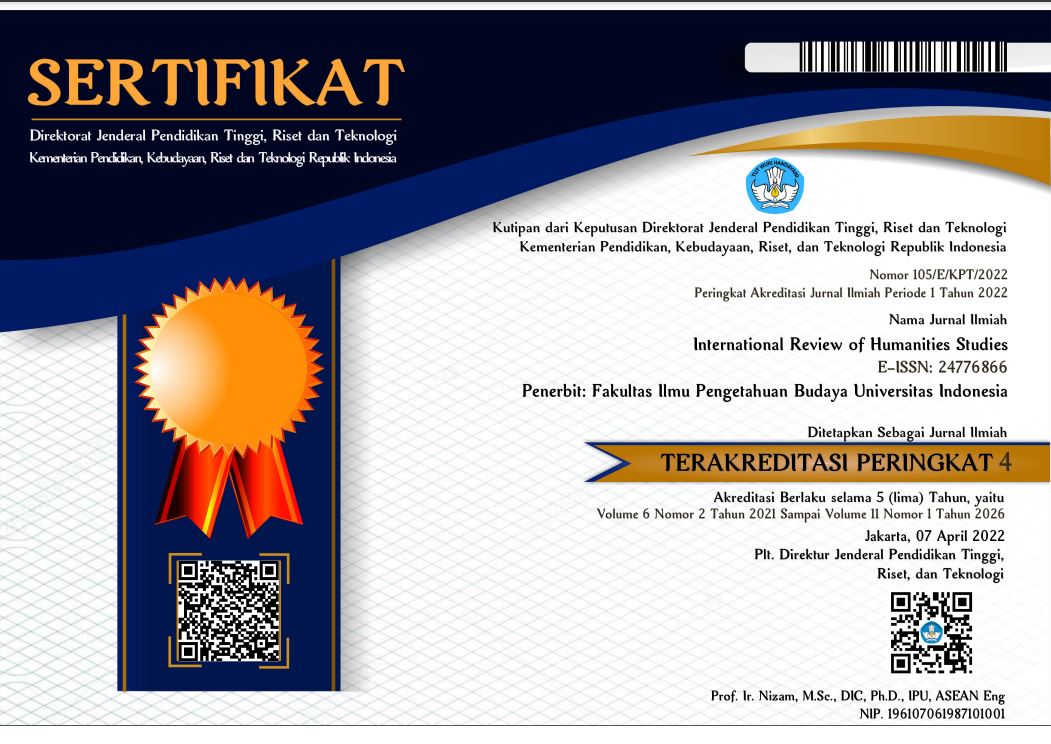International Review of Humanities Studies

Abstract
The phenomenon of sharenting refers to the practice of parents, particularly mothers, sharing personal information in the form of text, photos, or videos about their child-rearing experiences and journey to parenthood on social media platforms. Social media, as a space of simulation, is considered to present an idealized version of parenting, showcasing perfect moments and achievements. This paper critically explores how the phenomenon of sharenting, especially by millennial mothers in Indonesia, contributes to the construction of family life representations that underlie parents' adaptation to idealized parenting standards on social media platforms. The paper samples sharenting content from several Instagram accounts considered as Indonesian “momfluencers”. Baudrillard's concept of hyperreality is employed to highlight the blurring of boundaries between reality and simulation in parenting practices, which can create unrealistic expectations for parents. By analyzing the intersection of sharenting and hyperreality as observed on the Instagram accounts of the sampled momfluencers, this paper discusses the implications for parents who may feel incapable or pressured to meet such parenting standards.
References
Afiyanti, Y. & Solberg, S. (2014). “it is my destiny as a woman”. Journal of Transcultural Nursing, 26(5), 491-498. https://doi.org/10.1177/1043659614526243
Ayu Saraswati, L. (2010). Cosmopolitan Whiteness: The Effects and Affects of Skin-Whitening Advertisements in a Transnational Women’s Magazine in Indonesia. Meridians, 10(2), 15–41. https://doi.org/10.2979/meridians.2010.10.2.15
Barnes, R. & Potter A. (2021) Sharenting and parents’ digital literacy: an agenda for future research, Communication Research and Practice, 7(1), 6-20, DOI: 10.1080/22041451.2020.1847819
Brosch, A. (2016). When the child is born into the internet: sharenting as a growing trend among parents on facebook. The New Educational Review, 43, 225-235. https://doi.org/10.15804/tner.2016.43.1.19
Capdevila, R., Dann, C., Lazard, L., Roper, S., & Locke, A. (2022). #mothersday: Constructions of motherhood and femininity in social media posts. Feminism & Psychology, 32(3), 336-356. https://doi.org/10.1177/09593535221107832
Damayanti, N. L., & Hidayat, M. A. (2019). Hiperreality Of Social Media: A Phenomenology Study of Self Confession of Housewives of Facebook Users. The Journal of Society and Media, 3(2), 261–277. https://doi.org/10.26740/jsm.v3n2.p261-277
Dobson, M., & Jay, J. (2020). 'Instagram has well and truly got a hold of me': Exploring a parent's representation of her children. Issues in Educational Research, 30, 58-78.
Gazit, T. and Amichai‐Hamburger, Y. (2020). Factors underlying engagement in facebook support groups of female infertility patients. Psychological Reports, 124(3), 1150-1173. https://doi.org/10.1177/0033294120934703
Ghaffari, S. (2022) Discourses of celebrities on Instagram: digital femininity, self-representation and hate speech, Critical Discourse Studies, 19(2), 161-178, DOI: 10.1080/17405904.2020.1839923
Gibson, C. L. (2019). Enacting Motherhood Online: How Facebook and Mommy Blogs Reinforce White Ideologies of the New Momism. Feminist Encounters: A Journal of Critical Studies in Culture and Politics, 3(1-2), 06. https://doi.org/10.20897/femenc/5912
Hasanah, F., Ermawati, M. (2022). Sharenting Of Young Mothers In Yogyakarta: A
Phenomenological Study. JOYCED : Journal of Early Childhood Education, 2(2), 133-146. https://doi.org/10.14421/joyced.2022.22-04
Hays, S. (1998). The Cultural Contradictions of Motherhood. New Have, CT: Yale University Press.
Heath, H.E. (2006). Parenting: a relationship-oriented and competency-based process. Child welfare, 85 5, 749-66. https://www.jstor.org/stable/45398781
Holiday, S., Norman M. S. & Densley, R. L. (2022). Sharenting and the extended self: self-representation in parents’ Instagram presentations of their children, Popular Communication, 20(1), 1-15, DOI: 10.1080/15405702.2020.1744610
Huang, Y. (2019). The Construction of Hyper-Reality of Advertisement in Consumption Culture. Journal of Asian Research. DOI: https://doi.org/10.22158/jar.v3n2p190
Hudders, L., De Jans, S., & De Veirman, M. (2021) The commercialization of social media stars: a literature review and conceptual framework on the strategic use of social media influencers, International Journal of Advertising, 40:3, 327-375, DOI: 10.1080/02650487.2020.1836925
Lazard, L, Capdevila, R, Dann, C, Locke, A, Roper, S. (2019). Sharenting: Pride, affect and the day-to-day politics of digital mothering. Soc Personal Psychol Compass. 13:e12443. https://doi.org/10.1111/spc3.12443
Lazard, L. (2022). Digital mothering: Sharenting, family selfies and online affective-discursive practices. Feminism & Psychology, 32(4), 540–558. https://doi.org/10.1177/09593535221083840
Lee, B. (2022). Sharenting and Parenting Support Needs Of Mothers Raising Children With Rare Diseases. Korean Journal of Child Studies, 2(43), 153-167. https://doi.org/10.5723/kjcs.2022.43.2.153
Mardhiyah, M. I. (2020). Praktik Sharenting Dan Isu Young Digital Labour Dalam Proses Produksi Selebgram Anak (Studi Kasus Pada Akun Instagram@ Babymoonella) (Master’s thesis, Universitas Airlangga).
Orton-Johnson, K. (2017). Mummy Blogs and Representations of Motherhood: “Bad Mummies” and Their Readers. Social Media + Society, 3(2). https://doi.org/10.1177/2056305117707186
Padoa, T., Berle, D., & Roberts, L. (2018). Comparative social media use and the mental health of mothers with high levels of perfectionism. Journal of Social and Clinical Psychology, 37(7), 514-535. https://doi.org/10.1521/jscp.2018.37.7.514
Roshita, A., Schubert, E.E., & Whittaker, M.A. (2012). Child-care and feeding practices of urban middle class working and non-working Indonesian mothers: a qualitative study of the socio-economic and cultural environment. Maternal & child nutrition, 8 3, 299-314. DOI: 10.1111/j.1740-8709.2011.00298.x
Tach, L. (2012). Family Complexity, Childbearing, and Parenting Stress: A Comparison of Mothers’ and Fathers’ Experiences. National Center for Family & Marriage Research Working Paper Series.
Tugwell, S. (2022). Online breastfeeding publics: sociality, support and selfies. Feminism & Psychology, 32(3), 318-335. https://doi.org/10.1177/09593535221104877
Turiel, E. (2005), The many faces of parenting. New Directions for Child and Adolescent Development, 2005: 79-88. https://doi.org/10.1002/cd.130
Wardhani, P., Sekarasih, L. (2021). Parental Decisions On Sharing Their Children's Private Information On Social Media Among Families In Jakarta Area. Makara Hubs-Asia, 2(25), 127-136. https://doi.org/10.7454/hubs.asia.1161121
Womby, K. (2021). Single Motherhood, Media, Methods, And Messiness: Exploring Virtual Reality As A Tool For Autobiographical Expression. Toronto Metropolitan University. Thesis. https://doi.org/10.32920/17117990.v1
Recommended Citation
Arybowo, Yosepha and Widhiasti, Maria Regina
(2024)
"HYPERREALITY IN SHARENTING: CHALLENGES OF BEING AN INDONESIAN PARENT TODAY,"
International Review of Humanities Studies: Vol. 9:
No.
2, Article 5.
DOI: 10.7454/irhs.v9i2.1306
Available at:
https://scholarhub.ui.ac.id/irhs/vol9/iss2/5
Included in
Anthropology Commons, Art and Design Commons, Creative Writing Commons, Cultural Heritage Law Commons, Education Law Commons, Film and Media Studies Commons, History Commons, Intellectual Property Law Commons, International and Area Studies Commons, Legal Writing and Research Commons, Linguistics Commons, Museum Studies Commons, Philosophy Commons, Urban Studies and Planning Commons


